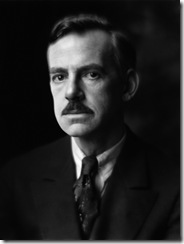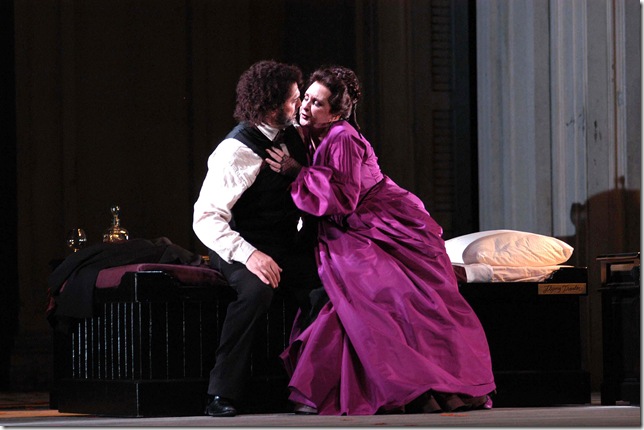In the elevator, Marvin David Levy didn’t even look over at the man standing close by. What he could feel from him – and it wasn’t nice – was all he needed to know.
The other man was Samuel Barber, whose Antony and Cleopatra had opened the new Metropolitan Opera House at Lincoln Center in September 1966, and was one of the most colossal failures in the history of the house.
Levy’s opera, Mourning Becomes Electra, on the other hand, had opened seven months later at the new Met, won mostly very positive reviews, and made a considerable impression during the course of its 11 performances over two seasons.
“Was he annoyed at me! I was looking the other way. He didn’t want to see me,” Levy said of his chance semi-encounter with Barber. “I didn’t say a word.”
But today, the composer offers some retroactive advice.
“It was something that anyone with theatrical sense could have told him would happen,” Levy said. “You take Shakespeare and you try to cut it down into sizable pieces, and you’re going to get a mish-mosh. And what kind of style is that going to be theatrically?”
Never let it be said that Levy lacks theatrical sense. His opera, a powerful adaptation of Eugene O’Neill’s sprawling 1931 epic, itself based on the Oresteia trilogy of Aeschylus, won for its then 34-year-old composer a 25-minute standing ovation on opening night (March 17, 1967) and praise from no less an eminence than Leonard Bernstein.
The conductor wrote to Levy after the opening night to say that he found Mourning Becomes Electra to be “a tremendous achievement, a remarkable work, stunningly performed.” Leading reviewers concurred, with Paul Hume of The Washington Post writing that Levy’s work was “the finest American opera yet to come to the Met’s stage.”
But despite all that positive critical and audience buzz, it took 30 years for its second mounting, at Chicago’s Lyric Opera in 1998. Levy extensively revised the opera for that production, after which it was picked up by the Seattle Opera in 2003 and the year after that, by New York City Opera.
This month, it is at last getting its fifth production, and in the city Levy has called home for decades. Florida Grand Opera has chosen to open its 73rd season with the opera, beginning with two performances at the Broward Center for the Performing Arts in Fort Lauderdale before traveling south to the Ziff Ballet Opera House at Miami’s Adrienne Arsht Center.
Levy, now 81, who lives in a modest home in Fort Lauderdale’s Riverland section, was critical to the creation of what is now FGO. His revamping in the early 1990s of Lauderdale’s Opera Guild led to its merger with the Greater Miami Opera, and its renaming as Florida Grand Opera.
FGO’s current executive director, Susan Danis, said she had known of the opera for some time, and that her former boss at the Sarasota Opera, Victor DeRenzi, also wanted to produce it.
“I’ve heard people who are huge opera people tell me that it was one of the most amazing nights in the theater for them … and plus, for me, there’s a real importance that Broward feels loved,” Danis said late last year. “To do something that’s virtually a new production (and that) honors a resident of Fort Lauderdale who can be there … There’s nothing like a composer coming out and taking a bow on opening night. The excitement on that – this will probably get national if not international buzz.
“And so my marketing side and my artistic side, all of them just kind of came together, and that’s really how we decided to start with it,” she said. “And, I just think it’s a great piece of music.”
Mourning, set in Massachusetts at the end of the Civil War, tells the story of the Mannon family, whose matriarch, Christine (Clytemnestra in Aeschylus), has been seduced by Adam Brant (Aegisthus), the handsome bastard son of her unloved husband’s uncle and a serving girl. Christine poisons her husband Ezra (Agamemnon), but before he dies, he tells his daughter Lavinia (Electra), who was supposed to be Adam’s lover, about Adam and Christine’s affair.
Lavinia has never liked her mother, and when her brother Orin (Orestes) returns from the war, they spy on Adam and Christine. After the lovers part, Orin, in a rage, stabs Adam to death, then tells Christine what he has done, and she shoots herself. A year later, Lavinia and Orin return from travel to the South Seas. Orin threatens to reveal the family’s sordid history to her fiancé, Peter, and kills himself when Lavinia rejects his molestating advances. Alone with Peter, she tells him she still loves the dead Adam Brant, sends Peter away, and shuts herself up in the family home.
“It’s operatic to begin with. The whole story is operatic,” Levy said. “The basic fact of that text is that O’Neill knew that he did not possess a poetic ear. It was that that was missing from the plays. He wrote an opera without music.”
That said, there are some memorable lines, Levy said, and he and his librettist Henry Butler made sure to use them.
“I remember one in particular: ‘Do not cry, Lavinia. The damned do not cry,’” he said. “Lines like that happen periodically, so you can’t say he didn’t have it. But they don’t happen all the time, and they don’t happen where he wanted it.”
The composer who tried to give the play its musical eloquence is a native of Passaic, N.J., who went to Metropolitan Opera matinees every Saturday with his family as a child. He studied with composers Philip James at New York University and Otto Leuning at Columbia, and won Guggenheim fellowships, two Prix de Rome awards, and a residency at the MacDowell Colony, among other honors.
He also worked as an opera administrator and proprietor of an artist management company, wrote music for TV commercials and taught composition at Brooklyn College. His works include several other operas, including one for children called The Zachary Star; orchestral works including a symphony and a piano concerto; chamber pieces such as a string quartet and a Hasidic Suite for horn and piano; and choral music, including a Jewish sacred service and in 2011, a Holocaust-themed oratorio called Atonement, which was narrated by former New York Gov. Mario Cuomo.
“I can say in all honesty that I’m just about as self-taught as they come,” he said, then tells the story of how, in 1957, on a plane to New Mexico for a production of his opera The Tower, he realized that he was going to hear his orchestration for the first time.
“And it dawned on me that I was actually going to hear combinations of instruments that have to add up to something,” Levy said. “The more I thought about it, the more it clarified itself to me that I had to hear, in my ear, what this is going to sound like.
“And it turns out that the orchestration was very good,” he said. “I got it from somewhere, but I don’t know from whom. It wasn’t from those teachers.”
 The idea of making an opera from O’Neill’s play had been “floating around for some time, but nobody could get the rights” from the playwright’s widow, Carlotta. A friend of Levy’s interceded for him, and Levy repaid the favor by lunching with Carlotta O’Neill once a month for some time as he worked on the project, though he said Carlotta did not see the opera when it was finished.
The idea of making an opera from O’Neill’s play had been “floating around for some time, but nobody could get the rights” from the playwright’s widow, Carlotta. A friend of Levy’s interceded for him, and Levy repaid the favor by lunching with Carlotta O’Neill once a month for some time as he worked on the project, though he said Carlotta did not see the opera when it was finished.
But Levy’s work on the opera came to the attention of another friend, Paul Jaretzki, who was an assistant artistic administrator to legendary Metropolitan Opera boss Rudolf Bing. The Met had some grant money for a new work, Levy said, and Jaretzki asked him whether he’d be interested.
“I just let it go by, but he pursued it, and asked me if I’d be willing to have a reading of Act One,” Levy said. “We did it in a big room on top of the Met, and nobody seemed to like it at that time. And I didn’t care in particular, because I didn’t expect anything from that. But the Met pursued it.”
His opening-night cast included Evelyn Lear as Lavinia and Marie Collier as Christine, both making their Met debuts, and a young baritone named Sherill Milnes as Adam Brant. John Reardon and John Macurdy also were in the cast, which was staged directed by Michael Cacoyannis (who helped rework the libretto, Levy said); Zubin Mehta conducted.
Levy’s score, reminiscent of the tonal expressionism of Berg, was composed during a period when every classical composer felt compelled to write in the 12-tone style pioneered by Berg’s teacher, Arnold Schoenberg. When the Lyric Opera of Chicago picked up Mourning in 1998, Levy revised it substantially.
“I grew up at a point in American music where everything was turning to serial music. And I made the mistake of getting on that bandwagon briefly. It wasn’t my true nature, and it wasn’t my true musical leaning,” Levy said. “But I did it for a period of time, and then I just came back. The major revisions to ‘Mourning,’ musically speaking, came with the Chicago performances, because there I took the piece apart and really wrote what I should have written at the beginning, which is much more lyrical.
“And maybe it shouldn’t have been. I’m too close to it to know,” he said. “But that’s what came out when you shook it. That’s what fell out.”
The cast for Florida Grand Opera’s Mourning Becomes Electra features Lauren Flanigan as Christine and Kevin Langan as Ezra, Rayanne Dupuis as Lavinia, Morgan Smith as Adam and Kevin Phares as Orin. Thomas Lehman is Peter, Riley Svatos is Helen, and Nelson Martinez is Jed. Except for Flanigan and Langan, the cast is new to FGO, as is the director, Minnesota-based Kevin Newbury, who mounted an effective rethinking of Gounod’s Romeo et Juliette for Palm Beach Opera two seasons ago. Ramon Tebar will direct the FGO Opera Orchestra and chorus.
Levy is pessimistic about the future of opera and of classical music as art forms, but at the same time he allows for the possibility of a memorable voice coming through.
“Every once in a while there is a flicker of real sentiment — and I don’t mean sentimentality — that raises its eyebrow and says, ‘Listen to me. I’ve got something to say.’ And if it speaks to you, then it’s worth keeping.
“One good gauge will be how the audience here receives this opera, because they will be attacked by something dramatic they can hold onto,” Levy said. “And if they can’t hold onto the music, they will hold onto the drama. And even if the drama is overwritten, it will not seem overwritten as an opera.”
MOURNING BECOMES ELECTRA opens at 7:30 p.m. Thursday at the Broward Performing Arts Center, Fort Lauderdale, and can be seen there again at 7:30 p.m. Saturday. The production then moves to the Ziff Ballet Opera House, Miami, where performances are scheduled for 7 p.m. Nov. 16, 2 p.m. Nov. 17, 8 p.m. Nov. 19 and 8 p.m. Nov. 23. Tickets are available at 800-741-1010 or visit www.fgo.org.

